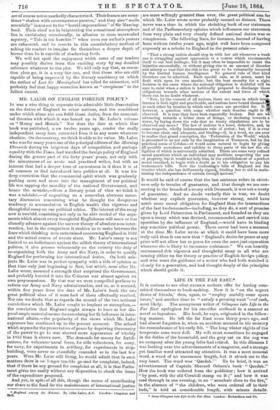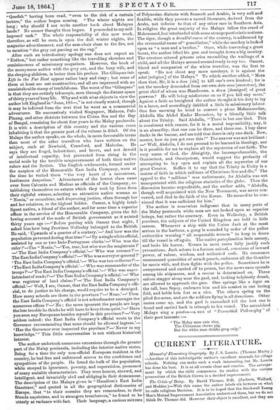LIFE IN THE FAR EAST.*
IT is curious to see what excuses authors offer for having com- mitted themselves to book-making. Now it is "on the urgent desire of friends," then, again, to "employ usefully some spare hours," and another time to "satisfy a pressing want "—of cash, most likely. The anonymous writer of Glimpses into Life in the Far East apologizes for his cacoethes scribendi in a manner as novel as ingenious. His book, he says, originated in the follow- ing manner. He left the far East some thirty years ago, and had almost forgotten it, when an accident aroused in his memory the remembrance of his early life. "The long winter nights of the temperate zone were dull. My wife must sometimes be engaged in the duties of the household, and the grey cat on the rug was no company after the young folks had retired. In this dilemma I was looking over the advertisements of a magazine, and a strange yet familiar word attracted my attention. It was a most unusual word, a word of no uncommon length, but it struck me to the very heart. The word was Quedah.' " To be brief, it was an advertisement of Captain Sherard Osborn's book " Quedah." How the book was ordered from the publisher ; how it arrived "by post, with the old Comhill stamp on it ;" and how it was read through in one evening, in an "armchair close to the fire," in the absence of "the children, who were ordered off to their beds," is told at considerable length, with minute details.
* Some Glimpses into Life in the Far East. London: Richardson and Co.
"Quedah" having been read, "even to the risk of a curtain lecture," the author began musing. "The winter nights are long ; why should I not write another book about Malayan lands? No sooner thought than begun. I proceeded to my self- imposed task." The whole responsibility of this new work, therefore, as will be seen, is upon the dull winter nights, the magazine advertisement, and the arm-chair close to the fire, not to mention "the grey cat purring on the rug."
After such an introductory apology one does not expect an "Eothen," but rather something like the travelling sketches and reminiscences of missionary magazines. However, the book of the anonymous author with the grey cat, and the busy wife, and the sleeping children, is better than his preface. The Glimpses into Life in the Far East appear rather hazy and rimy ; but some of them at least are not unattractive, and all are impressed with an unmistakeable stamp of truthfulness. The worst of the "Glimpses" is that they are entirely telescopic, seen through the distant space of thirtyyears of busy life. Whyand with what objects in view the author left England in "June, 183—," is not clearly stated, though it may be inferred from the text that he went as a commercial adventurer. He successively visited Singapore, Malacca, Pubo Pinang, and other districts between the China Sea and the Bay of Bengal, remaining for about four years in the Malay peninsula. It is with a description of this country and the various races inhabiting it that the greater part of the volume is filled. Of the Malays the author speaks, on the whole, in more favourable terms than most of the other travellers who have written on the subject, such at Newbold, Crawfurd, and Malcolm. He says they are frugal, industrious, and brave, and not devoid of intellectual capacity, but prevented from rising in the social scale by the terrible misgovernment of both their native rulers and the British. The English settlements, formed under the auspices of the Honourable East India Company, were at the time he visited them "the very heart of a monstrous, loathsome despotism." Adventurers of the lowest class came over from Calcutta and Madras as officials of the Company, es- tablishing themselves on estates which they took by force from their rightful owners, selecting an attractive native woman as " Nonia," or concubine, and dispensing justice, of ten through her and her relatives, to the highest bidder. Oamut, a highly intel- ligent native, a friend of the author, and for some time a superior officer in the service of the Honourable Company, gives the fol- lowing account of the mode of British government as it existed thirty years ago :—" Before parting with Oamut that night, I asked him how long Province Wellesley belonged to the British. He said, 'Upwards of a quarter of a century.'—' And how was the population governed during that time?'—' By a single white official, assisted by one or two Indo-Portuguese clerks.'—' Who was the ruler ?'—The " Nonia."—'Yes, true, but who was the magistrate ?' —‘ The East India Company's official.'—' Who was coroner ?'— The EastIndia Company's official Who was surveyor-general ?' The East India Company's official.'—' Who was tax-collector?'— ' TheEast India Company's official.'—' Who was commander of the troops?'—' The East India Company's official.'—' Who was su per- intendentof roads?'—' The East India Company's official.'—' Who was registrar of land claims ?'—.‘ The East India Company's official.'—' Well, I see, Oamut, that the East India Company's offi- cial, to do justice to his charge, would require to be a demigod. How many schools are there in the province ?'—' None.'—' Then the East India Company's official is not schoolmaster amongst the numerous offices No; the more ignorant the people are kept the less trouble he thinks he will have to keep them quiet.'—' Have you seen any Europeans besides myself in this province?'—' Very seldom indeed ; the East India Company's official wrote to the Governor recommending that none should be allowed ingress.'— ' Has the Governor ever inspected the province ?'—' Never to my knowledge.'" This little conversation is not without historical interest.
The author undertook numerous excursions through the greater part of the Malay peninsula, including the interior native states. Being for a time the only non-official European resident in the country, he had free and unfettered access to the confidence and sympathies of the people. He found the bulk of the population, while steeped in ignorance, poverty, and superstition, possessed of many amiable characteristics. They were honest, shrewd, and intelligent, and invariably civil and obliging in their demeanour. The description of the Malays given in "Hamilton's East India Gazetteer," and quoted in all the geographical dictionaries of Europe, that "to their enemies they are remorseless, to their friends capricious, and to strangers treacherous," he found to be utterly at variance with fact. Their language, a curious mixture of Polynesian dialects with Sanscrit and Arabic, is very soft and flexible, while they possess a sacred literature, derived from the Arabs, not inferior to that of any other race in Southern Asia, In religion the great majority of the Malays follow the creed of Mahommed, but interlarded with some strangepantheistic notions. The tiger, though a dreadful curse of the country, is addressed by the reverential name of" grandfather," while the monkey is looked upon as "a man and a brother." Once, while traversing a great forest, the author lifted his gun and brought down a big monkey. The creature uttered piteous cries resembling the wailings of a child, and all the Malays around seemed ready to cry toa. Oamut, friend and companion of the white traveller, was the first to speak. "Do not shoot any more monkeys, it is against the adat [religion] of the Malays." To which another added, " More than that, Sir, it is a doso [sin] to kill one's own kindred ; for is not the monkey descended from our own dato nene [ancestors], the great chief of whom was Handoman, a dewa [demigod] of great prowess? He will bring misfortune on us if you kill any more." Against a faith so benighted the author thought it his duty to lay in a lance, and accordingly dabbled a little in missionary labour. One fine morning he tried to convert a pious Mahommedan, Abdulla Bin Abdul Kader Moonshee, by a friendly little talk about the Trinity. Said Abdulla, "There is but one God. This is consistent with reason, for it is a moral impossibility, nay, it is an absurdity, that one can be three, and three one. I buy three ducks in the bazaar, and am told that there is only one duck. Now, master, how do you get over this?" The answer was not brilliant : —" Well, Abdulla, I do not pretend to be learned in theology, nor is it possible for me to explain all the mysteries of our faith. The very name of God, the Almighty, the Incomprehensible, the Omniscient, and Omnipotent, would suggest the profanity of attempting to lay open and explain all the mysteries of our great Creator. Suffice it to say that the Trinity in Unity is a matter of faith in which millions of Christians live and die." The appeal to the " millions " was unfortunate, for Abdulla was not unacquainted with the religious statistics of the globe. Thus the discussion became unprofitable, and the author adds, "Abdulla, though well acquainted with the New Testament, was never con- verted, and died in the faith of the Koran. He seemed to be con- vinced that it was sufficient for him."
The author is somewhat indignant that in many parts of the Malay peninsula white men are not looked upon as superior beings, but rather the contrary. Even in Wellesley, a British province, the subjects of the United Kingdom are held in little esteem. Whenever a ship with the Union Jack at the mast arrives in the harbour, a gong is sounded by order of the police authorities warning " all respectable women" to keep in doors till the vessel is off again. The native paterfamilias feels uneasy, and locks his harem. Events in most cases fully justify such precautions. Jack ashore is a furious animal, conscious of inward power, of valour, wisdom, and unlimited cash. He consumes unmeasured quantities of arrack punch, embraces all the Gentiles he meets with, and then fights with the police. Sometimes he is overpowered and carried off to prison, but the news soon spreads among his shipmates, and a rescue is determined on. Three sailors stagger along near the gaol, and, looking helplessly drunk, are allowed to approach the gate. One springs like a tiger on the tall, lean Sepoy, embraces him and his musket in one loving fold, and holds him fast as a vice. The others spring on the piled fire-arms, and.set the soldiers flying in all directions. Other mates come up, and the gaol is ransacked till the lost one is found and carried back in triumph to his vessel*. The astonished Malays sing a pantun—a sort of "Proverbial Philosophy" of their poet laureate :—
"The Malay man eats rice, The Chinaman chews pig,
But the whits man drinks grog only."































 Previous page
Previous page